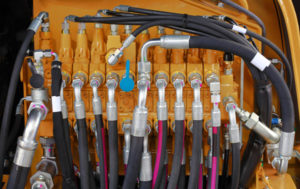The team at Hoseright is proud to offer 24/7 mobile maintenance services for hydraulic systems in Perth and regional Western Australia. You never know when your hydraulic system might break down – if it’s the middle of the night and you’re hemorrhaging money you shouldn’t have to wait until business hours to get the problem fixed!
Many operations can’t function or conduct business at all without a fully-functioning hydraulic system. It’s important to have an expert team who can fix your problems where you are, and when you need them so that you don’t need to deal with the stress of missed workdays and lost revenue.

Situations That Call for 24/7 Support
Many industries are heavily reliant on hydraulic systems and it is important to have support available at all times. For example:
Hydraulics in Trucks
Whether you are a council garbage man using a hydraulic arm to empty wheelie bins or a long-haul trucker using hydraulic lifts to load and unload freight, the chance is if you’re working with trucks you’re working with hydraulics. When that hydraulics fail it’s usually impossible or unsafe to continue with your job until they’re fixed. With 24/7 services it doesn’t matter if your hydraulics fail during a 3am transportation run; a team can have you back on the road before sunrise.
Hydraulics in Mining
The mining industry relies on hydraulic systems at almost all levels of operation, from trucks with hydraulic lifters to hydraulic diggers and even extremely high-pressure hoses for hydraulic mining. Most mines run both day and night, so without prompt, efficient, 24/7 maintenance services, an entire night’s profits could be wasted away due to faulty hydraulics.
Hydraulics on the Farm
Australian agriculture also relies heavily on hydraulic technologies to operate smoothly. There are hydraulic seeders, hydraulic trimmers to keep fruit trees in check, and most tractors use hydraulic technology as well. It doesn’t matter if you’re running a large industrial food operation or a small organic farm if your technology fails you’ll be losing money – not to mention potentially creating shortages in the food supply! 24/7 support that can fix your problem on-site is essential.
Our World Class Technicians Can Help
No matter what problem has arisen in your hydraulic system, Hoseright’s technicians will expertly diagnose the issue and fix it as efficiently as possible without sacrificing quality workmanship. Our team works with top of the line new hydraulics systems, including high-performance systems that need to be kept in excellent condition, as well as difficult older systems that need a bit more elbow grease. We also stock only the highest quality industrial Hose Fittings and can carry out the professional installation of any parts needing replacement.

